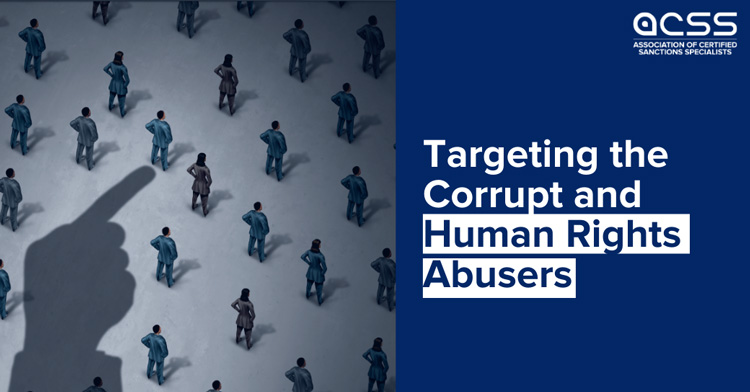June 22, 2020
By: Natasha Bright, Reporter, ACSS
The United States Office of Foreign Assets Control administers many different programs that it uses to sanction individuals and entities, including the Iran Sanctions, Non-Proliferation Sanctions, and Counter-Terrorism Sanctions. There is one specific program; however, that is instrumental in combatting severe human rights abuse or corruption in a foreign country – the Global Magnitsky Human Rights Accountability Act, or GLOMAG, program.
“The Global Magnitsky Human Rights Accountability Act employs a regulatory regime, which has been traditionally associated with economic sanctions and export controls, to combat corruption and human rights violations,” says J. Daniel Chapman, CEO of Presyse – Compliance Systems and Expertise. “In doing so, it reflects a continued recognition of the connection between violations of corruption, export controls, economic sanctions, and human rights laws and of the associated need for their multi-disciplinary, multi-agency enforcement.”
The original Magnitsky sanctions targeted Russian officials pursuant to the Russia and Moldova Jackson-Vanik Repeal and Sergei Magnitsky Rule of Law Accountability Act of 2012. In December of 2017, however, Executive Order 13818 expanded Global Magnitsky sanctions globally.
It gives OFAC and the U.S. Department of State the authority to sanction human rights offenders or other persons who have materially assisted significant acts of corruption, freeze their assets, and ban them from entering the U.S.
Who’s been designated?
EO 13818 listed the first 13 designations under the GLOMAG program. These included Dan Gertler and related entities. According the Treasury Department press release, “Dan Gertler (Gertler) is an international businessman and billionaire who has amassed his fortune through hundreds of millions of dollars’ worth of opaque and corrupt mining and oil deals in the Democratic Republic of the Congo (DRC).”
As of May 2020, the United States Office of Foreign Assets Control has 195 entities and individuals in 25 separate countries listed as “Specially Designated Nationals and Blocked Persons” under the GLOMAG program.
The three countries that have seen the most designations are:
Democratic Republic of Congo: Freedom House gives the DRC a freedom score of 18/100 points, noting the rampant electoral corruption and human rights abuses by government forces.
Cambodia: Respect for human rights deteriorated and the number of political prisoners increased in 2019, according to Human Rights Watch.
Serbia: In its latest country report, the State Department listed the targeting of LGBTI individuals and allegations of torture by police among the human rights issues in Serbia.
| Sanctions Designations by Type | |
| Individual | 96 |
| Entity | 103 |
| Total Sanctions | 199 |
| Sanctions by Crime | |
| Corruption | 120 |
| Human Rights Abuse | 65 |
| Both | 14 |
*Source: Human Rights First
Complying with GLOMAG sanctions
The purpose of the GLOMAG sanctions is to cut off corrupt individuals from the U.S. financial system. According to the U.S. Treasury Department FAQs, “all of the property and interests in property within U.S. jurisdiction of the designated individuals and entities are blocked, and U.S. persons are generally prohibited from engaging in transactions with them.”
According to Chapman, high-risk companies need to screen against the OFAC SDN list, especially if they do business in jurisdictions known for corruption. They can do this through the OFAC site or by using commercially available screening software. Publications such as the Transparency International Corruption Perception Index, the State Department’s Country Reports on Human Rights Practices, Freedom House and Human Rights Watch can help with determining your risk level.
If your company has heightened OFAC exposure, it may also make sense to go further and perform more detailed due diligence, such as research and screening for “politically exposed persons” and family members. It is essential to gather information on and verify beneficial owners of companies you have business relationships with as well, especially if those companies are in high-risk jurisdictions.
Why it’s important
Organizations run the risk of hefty fines and reputational harm from OFAC if they do business with designated individuals. On the flipside, by ensuring compliance with OFAC sanctions, you are part of a larger effort to combat global corruption.
On International Anti-Corruption Day of last year (December 9), OFAC reaffirmed its commitment to stamping out global corruption by adding 44 SDNs related to corruption and human rights abuse to its list. The agency’s statement highlights why corruption is problematic, stating that, “It undermines the abilities of governments to adequately care for their citizens; erodes the legal, moral, and ethical fabric of society; and facilitates transnational crime.”
Here are just a few of the bad actors listed in the December 2019 Global Magnitsky Human Rights Accountability Act Annual Report. Their offenses illustrate the importance of OFAC sanctions in combatting egregious activity:
- Min Aung Hlaing: designated for his role as the Commander-in-Chief of the Burmese security forces responsible for the brutal security operation that began in August 2017 in Rahkine State. “During this time, members of ethnic minority groups were killed or injured by gunshot, often while fleeing, or by soldiers using large-bladed weapons; others were burned to death in their own houses.”
- Mahmud al-Warfalli: served as commander of a militia known as the al-Saiqa Brigade. “Since 2016, al-Warfalli has carried out or ordered the killings of 43 unarmed detainees in eight separate incidents.”
- Ashraf Seed Ahmed Al-Cardinal: Five companies owned or controlled by Al-Cardinal were also designated. “In early 2019, the South Sudanese government made millions of dollars in payments to a company owned by Al-Cardinal; while the official reason was for the payment for food, the money instead went to senior South Sudanese government officials.”

